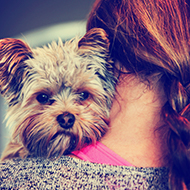A quarter of new owners admit buying a puppy on impulse

Around 83 per cent of respondents to the survey were not asked by the breeder about their suitability as owners.
A quarter of new dog owners admit to buying a puppy during the coronavirus pandemic with little research, according to a survey by the Kennel Club.
Findings published as part of the organisation's #BePuppywise campaign, reveal that 41 per cent of people bought a puppy to get through the isolation and anxiety of lockdown. But a worrying 25 per cent of new owners spent less than two hours doing their research.
Around 63 per cent of respondents to the survey said they felt that lockdown was the perfect time to get a puppy. But, concerningly, around a quarter said they could have inadvertently bought their new pet from a puppy farm.
Bill Lambert, head of health and welfare at the Kennel Club, said: “These hasty decisions not only play into the hands of the opportunistic scammers and puppy farmers operating during the pandemic – but can also sadly result in puppies being rehomed if owners haven’t carefully considered how their dog will fit their ‘normal’ life.”
The survey of 2,622 dog owners found that 42 per cent of people didn’t see the puppy’s breeding environment, in real-life or via video call. Moreover, a staggering 83 per cent of respondents said they weren’t asked any questions by the breeder about their suitability as owners.
It comes after research published by the Dogs Trust earlier this month, which revealed that one-quarter of puppies were rehomed before the recommended minimum age.
The survey also reveals that 15 per cent of new owners are worried about whether they can now afford their dog and associated costs. Around 34 per cent of respondents said that they don’t have pet insurance.
Bill Lambert continued: “In the current climate it’s never been more crucial to be puppywise via thorough, extensive research, taking time to find the right dog and breeder, and being aware of the red flags, as well as preparing for your new arrival and being a responsible owner. By wising up, you’re actively taking steps to prevent a potentially damaging lockdown legacy for puppies across the UK.”



 The latest
The latest